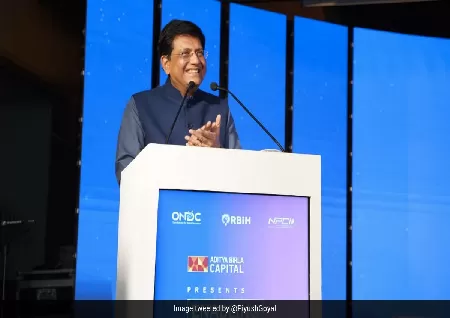India Apple to scale up manufacturing: Piyush Goyal

The CEO of Apple in India, Piyush Goyal, has made plans to increase production: Goyal spoke during the "B20 India Inception Meeting" opening ceremony, which was hosted under the G20's auspices at the Mahatma Mandir in Gandhinagar. He said that India had "clear policies" and a "conducive business" climate. According to Union Minister for Commerce and Industry Piyush Goyal, Apple Inc. wants to increase its manufacturing presence in India and increase the country's contribution to its worldwide production to 25%. "Apple already produces between 5 and 7 percent of its products in India. They want to produce up to 25% of their goods here, according to Goyal. "They released their most current models from India, produced here," he added.Speaking during the "B20 India Inception Meetingopening "'s ceremony, which was organised under its auspices Goyal spoke during the "B20 India Inception Meeting" opening ceremony, which was hosted under the G20's auspices at the Mahatma Mandir in Gandhinagar. He said that India had "clear policies" and a "conducive business" climate.The largest facility for producing Apple's iPhone is now being constructed in Bengaluru, India. Foxconn, Wistron, and Pegatron produce iPhones for the corporation in India.He cited the recent entry into India of a British maker of earthmoving goods as an illustration, asserting that firms had always excelled in India due to the country's competitiveness."They are supplying 110 nations across the world from India at reasonable, competitive pricing thanks to their capacity to create additional items." Many of their new product releases come from India as well.
In addition to praising the Indian government's open policies, Goyal said that a supportive business climate, which includes open business practises and government laws, is assisting multinational corporations in choosing India as their manufacturing hub.India provides the legal system. We don't use shady business practises or covert funding sources. We haven't done anything that the general public is unaware of, he declared. "Prime Minister Narendra Modi has raised the bar, so as long as we cooperate in the B20, we have a chance."He expressed the expectation that India will have a strong foundation for the B20 by August of this year.In his speech, N Chandrasekaran, chairman of Tata Sons, reaffirmed the B20 India goals, highlighting sustainability, the transition to clean energy, transportation, biodiversity, and water management.and the UN SDGs will be highlighted.
The G20 presidency is an opportunity for India to showcase and share best practises as well as work toward developing specific recommendations on bringing equality using digital transformation, he said, highlighting the success India has had with digital transformation, the deployment of digital infrastructure development programmes, and the delivery of public services.The G20 and all of its interaction groups need to be "inclusive, ambitious, decisive, and action-oriented," according to Amitabh Kant, India's Sherpa at the G20. The decoupling and de-monopolization of global value chains to increase their resilience, climate funding, and digital transformation are some of the main issues that will arise in the near future, he noted.
According to Ashwani Vaishnaw, minister of electronics and information technology, while protecting personal information is a laudable idea, it also worked as a barrier to innovation. "We needed a model for individual rights that promoted innovation while also being good for society." It's a challenging balance, he remarked.As of December 1, India presided over the G20. B20, which was founded in 2010, is one of the G20's most well-known involvement groups. Its members include businesses and business organisations.The B20 will be run by two action councils, seven task teams, and is tasked with creating consensus-based policy recommendations for the G20.
Related queries to this article
- Piyush Goyal
- Apple CEO
- B20 India Inception Meeting
- Mahatma Mandir
- Foxconn
- Wistron
- Pegatron
- Narendra Modi
- public services
Read more articles and stories on InstaSity Latest News.





